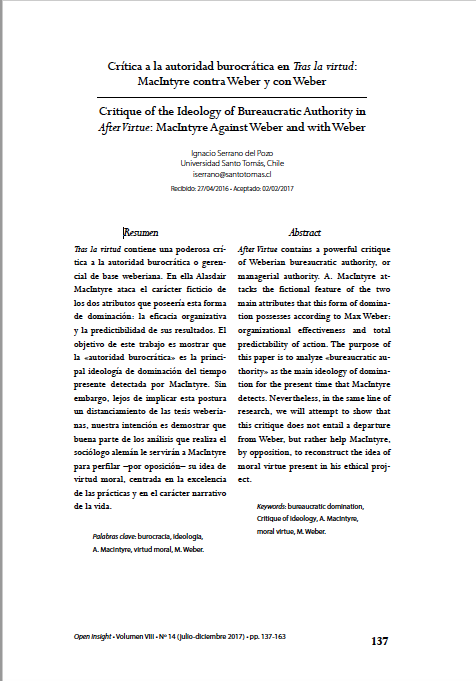Crítica a la autoridad burocrática en Tras la virtud: MacIntyre contra Weber y con Weber
Resumen
Recibido: 27/04/2016 • Aceptado: 02/02/2017 Tras la virtud contiene una poderosa crítica a la autoridad burocrática o gerencial de base weberiana. En ella Alasdair MacIntyre ataca el carácter ficticio de los dos atributos que poseería esta forma de dominación: la eficacia organizativa y la predictibilidad de sus resultados. El objetivo de este trabajo es mostrar que la «autoridad burocrática» es la principal ideología de dominación del tiempo presente detectada por MacIntyre. Sin embargo, lejos de implicar esta postura un distanciamiento de las tesis weberianas, nuestra intención es demostrar que buena parte de los análisis que realiza el sociólogo alemán le servirán a MacIntyre para perfilar –por oposición– su idea de virtud moral, centrada en la excelencia de las prácticas y en el carácter narrativo de la vida.Citas
Albrow, M. (1979). Bureaucracy. London: MacMillan Press.
Balstad Brewer, K. (1997). “Management as a Practice: A Response to Alasdair MacIntyre”. En Journal of Business Ethics 16: 825-833.
Beabout, G. (2013). The Character of the Manager: From Office Executive to Wise Steward. Palgram: Macmillan.
Beadle, R., Moore, R. (2006). “MacIntyre on Virtue and Organization”. En Organization Studies 23(3): 323-340.
Beetham, D. (1979). Max Weber y la teoría política moderna. Madrid: Centro de Estudios Constitucionales.
Bendix, R., (2012). Max Weber (Max Weber: An Intellectual Portrait). Buenos Aires: Amorrortu Editores.
Blackledge, P; N. Davidson, eds. (2005). Alasdair MacIntyre´s Engament with Marxism. Chicago: Haymarket Books.
Blackledge, P; K. Knight, eds. (2011). Virtue and Politics: Alasdair MacIntyre´s revolutionary Aristotelianism. Notre Dame: University of Notre Dame Press.
Breen, K. (2012). Under Weber´s Shadow: Modernity, Subjetivity and Politics in Habermas, Arendt and MacIntyre. Surrey: Ashgate Publishing.
Colino, C; E. del Pino, (2000). “Las dos caras de la administración burocrática en la obra de Max Weber”. En Revista de Ciencias Sociales, 19: 49-93.
Du Gay, P. (2000). En elogio de la burocracia: Weber, organización, ética, Madrid: Siglo XXI.
Ferrero I., A. Sison (2014). “A Quantitative Analysis of Authors, Schools and Themes in Virtue Ethics Articles in Business Ethics and Management journals. Business Ethics: A European Review 23(4): 375-400.
Gregory Jones, L. (1987). “Alasdair MacIntyre on Narrative, Community, and the Moral Life”. En Modern Theology 4(1), 1987: 53-69.
Knight, K. (2007). Aristotelian Philosophy: Ethics and Politics from Aristotle to MacIntyre.Cambridge: Polity Press.
Knight, K. (2011). “Revolutionary Aristotelianism”. En Virtue and Politcs: Alasdair MacIntyre´s Revolutionary Aristotelianism. Paul Blackledge y Kelvin Knight, eds. Notre Dame: University of Notre Dame Press.
Knight, K. (2013). “Alasdair MacIntyre’s Revisionary Aristotelianism: Pragmatism Opposed, Marxism Outmoded, Thomism Trasnformed”. En O’Rourke, F., ed. What Happened in and to Moral Philosophy in the Twentieth Century. Notre Dame: University of Notre Dame Press.
MacIntyre, A. (1977). “Utilitarianism and the Presuppositions of Cost-Benefit Analysis: An Essay on the Relevance of Moral Philosophy to the Theory of Bureaucracy”.
En Wachs M., ed. Ethics in Planning. New Jersey: The Center for Urban Policy Research. pp. 216-232.
MacIntyre, A. (1977b), “Epistemological Crises, Dramatic Narrative and the Philosophy of Science”, The Monist 60(4): 453-472.
MacIntyre, A. (1979). “Social Science Methodology as the Ideology of Bureaucratic Authority”. En The MacIntyre Reader. Cambridge: Polity Press, pp.53-68.
MacIntyre, A. (1983). “Moral rationality, tradition, and Aristotle: A reply to Onora O´Neill, Raimond Gaita, and Stephen R. L. Clark”. Inquiry: An Interdisciplinary Journal of Philosophy 26 (4): 447-466.
MacIntyre, A. (2007). After Virtue. Londres. Nueva York: Bloomsbury.
MacIntyre, A. (1987). Tras la Virtud, A. Valcárcel, trad. Barcelona: Editorial Crítica.
MacIntyre, A. (2001). Whose Justice? Which Rationality. London: Duckworth.
Mitzman, A. (2005). The iron Cage: An Historic Interpretation of Max Weber. New Brunswick: Transaction Books.
Mommsen, W. (2007). The Political and Social Theory of Max Weber. Cambridge: Polity Press.
Tester, H. (1999). “Weber’s Alleged Emotivism”. En British Journal of Sociology 50(4): 563-573.
Weber, M. (2013). La ética protestante y el espíritu del capitalismo, J. Navarro Pérez, ed.;
JL Villacañas, prólogo. Madrid: Ediciones Akal.
Weber, M. (2012). Economía y Sociedad: Esbozo de sociología comprensiva (Wirtschaft und Gesellschaft. Grundriss der Verstehenden Soziologie), J. Winckelmann, ed. México:
Fondo de Cultura Económica.
Weber, M. (2008). Escritos políticos, J. Abellán, ed. Madrid: Alianza Editorial.





